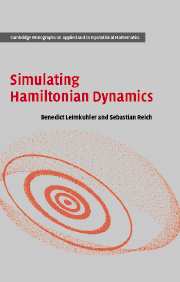Book contents
- Frontmatter
- Contents
- Preface
- Acknowledgements
- 1 Introduction
- 2 Numerical methods
- 3 Hamiltonian mechanics
- 4 Geometric integrators
- 5 The modified equations
- 6 Higher-order methods
- 7 Constrained mechanical systems
- 8 Rigid body dynamics
- 9 Adaptive geometric integrators
- 10 Highly oscillatory problems
- 11 Molecular dynamics
- 12 Hamiltonian PDEs
- References
- Index
11 - Molecular dynamics
Published online by Cambridge University Press: 04 December 2009
- Frontmatter
- Contents
- Preface
- Acknowledgements
- 1 Introduction
- 2 Numerical methods
- 3 Hamiltonian mechanics
- 4 Geometric integrators
- 5 The modified equations
- 6 Higher-order methods
- 7 Constrained mechanical systems
- 8 Rigid body dynamics
- 9 Adaptive geometric integrators
- 10 Highly oscillatory problems
- 11 Molecular dynamics
- 12 Hamiltonian PDEs
- References
- Index
Summary
Over the past several decades, molecular simulation has become increasingly important for chemists, physicists, bio-scientists, and engineers, and plays a role in applications such as rational drug design and the development of new types of materials. While many levels of detail can be incorporated if desired, in most cases work is performed with a simplified atomic model, consisting of a large number of mass points interacting in various types of forces, i.e. an N-body problem.
There are essentially two principal types of simulation methodology in common use. In Monte-Carlo (MC) methods, random steps are taken in order to achieve a rapid sampling of the most likely states of the molecule. In molecular dynamics (MD), the idea is to construct approximate trajectories for the N-body problem and to use these to gain an understanding of how the molecule evolves in time, for example in response to a stimulus, during a transition between states, or as a means for calculating averages. It should be stressed that only MD and not MC methods allow the theoretical possibility of obtaining time-dependent quantities from simulation, while both schemes can in principle be used for the same statistical-mechanical calculations. Increasingly, one finds that MD and MC schemes are combined in various ways to seek improved efficiency. In this chapter we will focus only on (pure) MD methods, and in particular on the geometric integration issues associated to computing MD trajectories. For a more complete perspective on molecular simulation, the reader is referred to a text on the subject such as that of Schlick, Allen and Tildesley, Rappaport, or Frenkel and Smit.
- Type
- Chapter
- Information
- Simulating Hamiltonian Dynamics , pp. 287 - 315Publisher: Cambridge University PressPrint publication year: 2005
- 1
- Cited by



